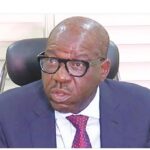Obaseki Declares Nigeria Technically Bankrupt
Obaseki Declares Nigeria Technically Bankrupt

In a bold assertion, Governor Godwin Obaseki of Edo State has declared that Nigeria is technically bankrupt, raising alarm about the country’s dire economic situation. This statement underscores the growing concerns surrounding the nation’s fiscal health and the challenges faced by its government in managing debts and resources.
Context of the Declaration
Obaseki’s declaration comes amid ongoing economic turmoil characterized by rising inflation, dwindling foreign reserves, and a significant debt burden. The governor emphasized that these factors have severely impacted the government’s ability to meet its financial obligations, leading to a precarious economic landscape for millions of Nigerians.
Economic Indicators
Recent economic indicators paint a troubling picture. Nigeria’s debt-to-GDP ratio has escalated, with the government borrowing extensively to finance its budget. Coupled with a decline in oil revenues—a critical source of income for the nation—Obaseki’s warning highlights the urgent need for a reassessment of fiscal policies and economic strategies.
Implications for Citizens
The ramifications of this declaration are profound. A technically bankrupt state may struggle to fund essential services such as healthcare, education, and infrastructure development. For ordinary citizens, this could mean reduced access to vital resources, increased unemployment, and a higher cost of living.
Calls for Action
Governor Obaseki’s comments are not merely a critique but also a call to action for both state and federal governments. He advocates for immediate economic reforms, including diversification of the economy, increased investment in agriculture, and improved revenue generation strategies. These measures are deemed essential for stabilizing the economy and ensuring sustainable growth.
Conclusion
Obaseki’s declaration serves as a wake-up call for policymakers and stakeholders across Nigeria. As the nation grapples with its financial realities, it is crucial for leadership to prioritize economic recovery and reform. Addressing these challenges will not only determine the future of Nigeria’s economy but also the welfare of its citizens. The time for decisive action is now, as the implications of inaction could be dire for the nation’s path forward.
TRENDING SONGS
 Heartbreak in Ikeja: Lady Weeps After Fufu Found in New Phone Package
Heartbreak in Ikeja: Lady Weeps After Fufu Found in New Phone Package
 Twist of Fate: Man Who Questioned Phyna’s ₦1Billion Demand Mourns Brother in Dangote Truck Crash
Twist of Fate: Man Who Questioned Phyna’s ₦1Billion Demand Mourns Brother in Dangote Truck Crash
 Tragedy in Enugu: Dangote Truck Claims Lives of Family of Five
Tragedy in Enugu: Dangote Truck Claims Lives of Family of Five
 Bangkok Crackdown: Nigerian-Thai Couple in Police Net Over Drug Trafficking
Bangkok Crackdown: Nigerian-Thai Couple in Police Net Over Drug Trafficking
 Family Rift: Reno Omokri’s Ex-Wife Says He Deserted Their Special Needs Son
Family Rift: Reno Omokri’s Ex-Wife Says He Deserted Their Special Needs Son
 The Man Who Sent Money for Two Decades, Only to Return to an Empty Shell
The Man Who Sent Money for Two Decades, Only to Return to an Empty Shell
 See how a young lady was beaten in a village and naked for stealing a goat
See how a young lady was beaten in a village and naked for stealing a goat
 See How Man That Plans to Divorce His Wife, Gets Shocked When She Leaves Him First With Their 5 Kids
See How Man That Plans to Divorce His Wife, Gets Shocked When She Leaves Him First With Their 5 Kids
 Tragic Land Dispute: Man Kills Father in Imo, Pastor Arrested for Rape
Tragic Land Dispute: Man Kills Father in Imo, Pastor Arrested for Rape
 Nigeria Grants Air Tanzania Passage for Direct Flights
Nigeria Grants Air Tanzania Passage for Direct Flights
Share this post with your friends on ![]()













